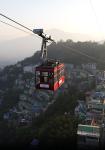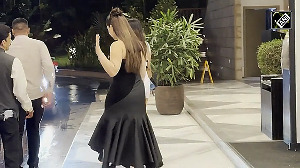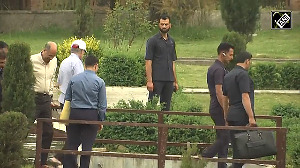‘The Congress or Kejriwal may be corrupt but at least you will not be thrashed black and blue. Your children will not be threatened by those regimes.’
‘Journalists’ jobs are less secure today. So they are more scared about challenging what they are told to do and what not to do.’
‘If the Aurangzeb road memory is valid, then the memory of the 2002 Gujarat riots is also valid.’

Journalist-turned-activist Teesta Setalvad, in her new book Foot Soldier of the Constitution: A Memoir, speaks of the rise of communalism and the aftermath of the 2002 Gujarat riots and as is to be expected of her, pulls no punches when it comes to her bete noire, Narendra Modi.
An excerpt: The chain of circumstances and the details of evidence, post Godhra, establish that the Chief Minister, Narendra Modi, and his cabinet colleagues had conspired, planned, prepared, organised and perpetrated multifarious crimes against the Muslim minority by causing and contriving to mobilise armed anti-Muslim mobs.
In an interview with Rediff.com’s Syed Firdaus Ashraf, Setalvad discusses her book, the various court cases filed against her and the state of secularism in the country.
Why did you think of writing this book? What was the idea behind it?
At many levels, one is seeing a complete submergence of the narrative in terms of communalism, in terms of its impact on State and society. A lot of that has got to do with the regime of today.
Whenever there is a popular regional option the BJP-RSS have been defeated. Maharashtra is a story of the Congress abdicating itself.
Somehow we are not able to rationally link up how damaging this onset of communalism at the state level, society level is and that it has a lineage and history. What we are seeing today has not happened overnight.
For example, what the gau-rakshaks did in Dadri and Una didn’t begin just now. It began in Gujarat somewhere in 1997-2002. Even before 2002, you saw the signs of this but we all collectively ignored it.
One of the main reasons (behind my book) was to bring in the written narrative, which is not only linear, of how communalism has deepened and caught a real stranglehold on Indian democracy.
-- 'Gau rakshaks are systematically targeting Dalits, Muslims'
Despite all that is said and written, Prime Minister Narendra Modi is ruling at the Centre and the Bharatiya Janata Party is winning almost every election in the country.
The BJP is not winning every state. Let me correct you. In 2014 they won the Lok Sabha elections; it was a dramatic victory and one cannot run away from it. They got a majority.
Within six months of that Arvind Kejriwal won in Delhi. Within 18 months of the Lok Sabha elections, Lalu Yadav and Nitish Kumar won the Bihar elections.
We will know what will happen in another five states on March 11.
It is true that in Maharashtra they have swept the local elections, but it is also true that these local elections have never got so much media coverage before. We must cover local elections as much we are doing now but we should not do so only when the BJP is coming to power.
Why am I saying this?
If you look at the same pattern in Rajasthan which is ruled by Vasundhara Raje, the BJP chief minister of Rajasthan, all the local elections are being won by the Congress party, but it is not getting any national media coverage.
Do you the feel the media has become pro-Modi?
I think the media is corporatised. A large section of it is, but I am not saying every bit of it. A handful of corporate entities own the media and journalists’ jobs are less secure today. So they are more scared about challenging what they are told to do and what not to do.
Earlier it was easier for us to challenge because we were secure in our job. We were not told to get out.
And, I think the media has become very lazy. It is not doing its homework and it is not moving into the field.

You are saying the media has become lazy, but a minister in the Modi government labelled the media as "presstitutes", and his supporters target the media for what they call its secular bias.
They want to make you even more scared, to be unable to challenge them.
See the response to Trump. Let me ask you a question. Criticism against Trump is across the board, sustained opposition on the streets, by the media, but why are we not able to do it here?
The tactic of any proto fascist force is to constantly attack.
If they have Rajdeep Sardesai or Barkha Dutt who among the spectrum are fair with all the limitations that they face, they will badger those people to ensure that they become defensive about it.
The Congress or Kejriwal may be corrupt but at least you will not be thrashed black and blue. Your children will not be threatened by those regimes.
If you remember, (journalist) Rahul Kanwal was doing a story on saffron terror in India Today and the entire office was attacked by the RSS and Bajrang Dal (external link).
They show they are anti-democratic and cannot tolerate dissent. They get away with it because the law and order agencies don’t act. Even what the Akhil Bharatiya Vidyarthi Parishad did last week in Delhi, the police was just watching it.
Since you speak of the incidents at Delhi's Ramjas college, do you think the police is upholding secular values?
We have to fight to reclaim it, that is what the book tries to appeal. So much space has been eroded, so much space has been lost. The citizens of India have to do it themselves.
We have to reclaim this space or we will become another Pakistan, Turkey or America under Trump.
See the response to Trump. Let me ask you a question. Criticism against Trump is across the board, sustained opposition on the streets, by the media, but why are we not able to do it here?
What is your opinion about it?
That is what this book addresses. Somehow we have to be courageous enough and bring out the collective conscience to do what the people in America are doing.
Maybe the people think what Modi is doing is right, therefore they are not coming out on the streets?
Thirty one per cent certainly do (the percentage of votes Prime Minister Narendra Modi won in the 2014 elections).
We have to fight to reclaim it (secularism). We have to reclaim this space or we will become another Pakistan, Turkey or America under Trump.
During the book release lecture you mentioned that the courts back-pedalled many times on communal issues.
One of my most painful experiences was about the 1992-93 Bombay riots. Shiv Sena chief Bal Thackeray was openly challenging the rule of law and courts. He gave a statement to Sanjh Jansatta newspaper. I still have a copy of that tabloid. If you or I had said what he has said in it about court judgments, contempt cases would have been slapped on us.
So my wider question was, when there is an open challenge to the judiciary, why have the courts been silent?
-- EXCLUSIVE! The Teesta Setalvad Interview: 'The DNA of this country will re-emerge!'
It is now 15 years since the Godhra train burning and the riots it set off. You also mentioned that there is a complete shutdown of memory.
I am going to write a piece on how much the media will actually remember February 27 and 28 and the riots that followed in 2002.
On the 10th anniversary of the tragedy, I remember, there were several articles and packages on television.
I don’t know what is going to happen this time because of the regime in New Delhi today. Many sects of Indians are functioning under a kind of self-censorship.
Do we talk about this or not talk about this? Is this a wise idea to talk about this?
During your lecture, you said memory cannot be allowed to lapse. Why are we thinking of the past all the time? The Godhra incident happened in the past. Why can’t we move on?
People are moving on. The point is, if for instance we can have a debate conducted in the political class which the media doesn’t question, on why Delhi's Aurangzeb Road needs to go or why Tipu Sultan road needs to go, is that not revisiting a memory of a certain kind?
We have in very powerful positions ‘chhotey dil aur chhotey dimaag ke log’ who have made a single point agenda, to try and target a few individuals and organisations.
You say you want it to go because you claim that they perpetrated some acts of injustice on a section of Indians.
But this is far more recent, right? If the Aurangzeb road memory is valid, then the memory of the Gujarat 2002 riots is also valid.
This is more valid because it is more recent.
My point is that you may have three-four sets of memories. In a democratic society, you have to allow that to play for some reconciliation and dialogue.
My real question after the 1992-93 Mumbai riots was that we did not allow real catharsis after Partition. In India, our textbooks clamped down on this. In society, nobody discussed it.
So it was not a coincidence for me to see that after the bloodshed of the 1992-93 riots, a spate of books came out to do with Partition. People realised it was wrong.
As a result of this, you had three sets of Indians believing in three sets of reality depending on where they were located geographically after 1947.
The Sikhs in Punjab were most brutally affected by the Muslims of Pakistan. They hate Muslims for that reason.
In Bengal, Hindus who came from East Pakistan suffered at the hands of Muslims but in Bihar, Muslims suffered at the hands of Hindus.
All these three communities have memories of that but there has never been a possibility of all of them coming together and saying that yes, we all three suffered, the suffering and hardship and the violence that came out of communal ideology, that can happen in any section which makes a demon and enemy out of another.
And by not doing this, you have a situation of everybody looking through the prism of their memory and never having a holistic memory of what Partition was.

Retrospectively, do you feel what Mohammed Ali Jinnah said back in 1947 about Hindutva was right?
Jinnah had a very short-sighted view of politics and he was a self-serving politician. He was a politician who was extremely secular in his behaviour and his outlook, but he used very communal language among the maulanas to whip up frenzy, which was extremely unhealthy so I would not say Jinnah was right about anything.
I think the parallel growth of the Rashtriya Swayamsevak Sangh, Hindu Mahasabha and Muslim League resulted in the vivisection of the Indian subcontinent, the RSS and Hindu Mahasabha are equally responsible for Partition, as much as the Muslim League is, but in Indian public memory it is only the Muslims, the Muslim League and Jinnah who are responsible for Partition.
That is where the selective memory comes, and that is dangerous.
On a personal front, given all the court cases against you, do you fear arrest?
If I live in constant fear I will stop doing the work I do. I do believe that we have in very powerful positions today chhotey dil aur chhotey dimaag ke log who have made a single point agenda to simply try and target a few individuals and organisations.
Citizens for Justice and Peace (Setalvad's NGO) has filed 68 cases in regard to the 2002 Gujarat riots and I have nine cases against me.
Now, I have to spend 20 per cent of my time battling those cases against me, my struggle is that. The rest of my time I carry on the work I am doing, and that I am managing.
Do you buy the theory that more the secular forces go against Modi, the stronger he becomes?
I don’t buy that argument.
Whenever there is a popular regional option the BJP-RSS have been defeated. Maharashtra is a story of the Congress abdicating itself. Pawar did not go to Pune to campaign for his party, the Nationalist Congress Party.
It (the BJP win) did not happen like that. It happened because there were certain reasons behind it.
However, Mamata Banerjee romped home in Bengal. She is not RSS-BJP. I told you about Kejriwal, Nitish-Lalu. Now let us wait for March 11, 2017, to see what happens.
I am very optimistic.









